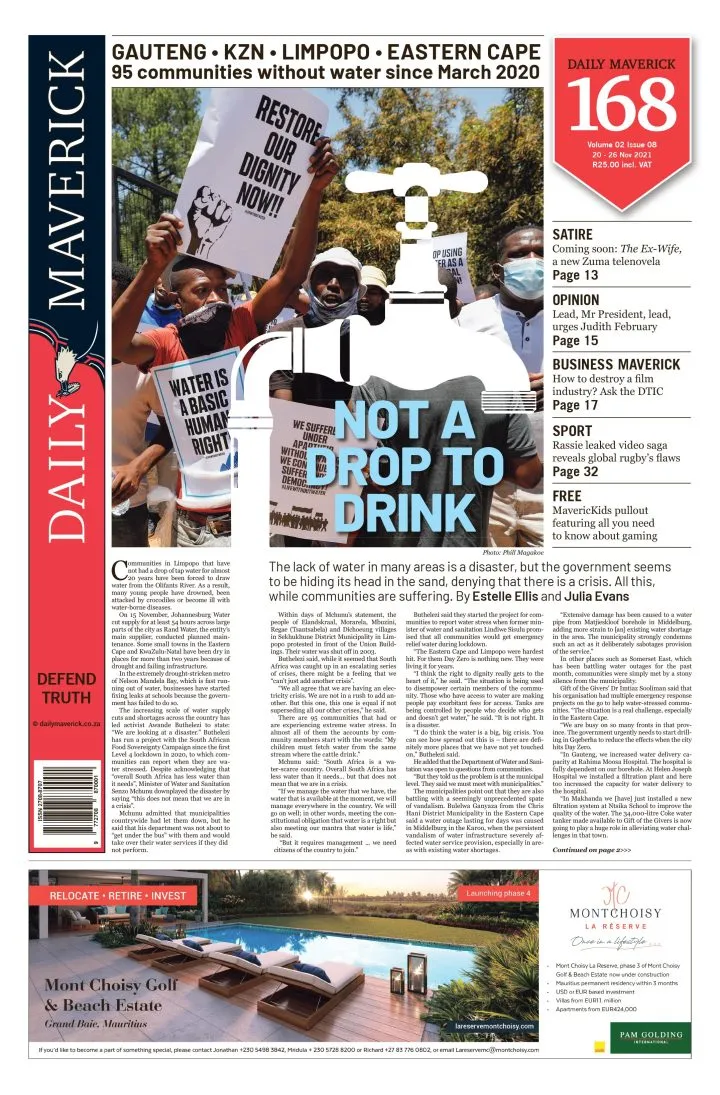In South Africa we are a motley mix of hopeful, disenchanted, imaginative, broken and sometimes deliberately obfuscatory people, yet we share one thing, namely our interconnectedness as people who live in the country, which has shaped us into the sometimes schizophrenic people that we are.
I am very reluctant to use the term I’m about to use to signal a sense of unity, because over the years it has been overused, quoted out of context and, worst of all, watered down into a dull postcard format, but “ubuntu” is a term that speaks to our connectedness and up until now I had yet to find a meaning for me that wasn’t linked to its many clichéd uses.
The concept of ubuntu, which for those who may still not know what it means, is an Nguni word, which, loosely translated, means “I am because you are” and has been touted to mean that recognising one another’s humanity is what connects us as people.
The term got popularised around the time South Africa was becoming a democracy based on the concept of reconciliation and the building of a “rainbow nation” that would hold the vision of our country, “united in our diversity” and shared humanity, together in powerful imagery. It’s a term that was in fact the antithesis of apartheid, or the more sanitised term some prefer of “separate development”.
One of those powerful images was the emergence of liberation movement the African National Congress as the victor in the elections led by the towering figure (both in stature and political ideology) of one Nelson Rolihlahla Mandela, who subsequently became a powerful global symbol of steadfast principle, sacrifice and reconciliation.
The image of newly elected democratic President Mandela on the podium on 10 May in 1994 lifting up the hands of his two deputies – one who was his own comrade and fellow liberation fighter, Thabo Mbeki, and the other his former oppressor and last apartheid president, Frederik Willem de Klerk – in a symbolic gesture of reconciliation was meant to illustrate this ubuntu that the country was now going to base its blueprint on.
Now the significance of that moment was meant to show a recognition of a divided and treacherous past and an investment in a more just and human future for the country as we looked towards building an inclusive future based on the recognition that all who live in South Africa have inherent human rights and ubuntu.
To quote part of our Constitution’s preamble: “We, the people of South Africa, recognise the injustices of our past; honour those who suffered for justice and freedom in our land; respect those who have worked to build and develop our country; and believe that South Africa belongs to all who live in it.”
However, if we cast our minds back, perhaps one of the first glaring signs that our ubuntu nation was showing loose threads at its seams was when De Klerk decided to resign as one of the deputy presidents in 1996, just two years after being appointed, as well as withdrawing the National Party, which he led, from the government of national unity. Another even more glaring sign may have been De Klerk’s refusal to fully disclose the events that took place under his presidency at the Truth and Reconciliation Commission.
It is not without significance that the week that De Klerk died after never having relented that apartheid was a crime against humanity, is the same week that Gcinisizwe Kondile, someone I never met but have an intimate knowledge of, and whom De Klerk’s apartheid government tortured, murdered and left his remains unknown and unrepatriated to his family and loved ones until 2016, was recognised posthumously with the gold Order of Mendi for Bravery. The order recognises South African citizens who have performed acts of bravery and goes on to say of Kondile that it is awarded “for his ultimate sacrifice to the liberation of South Africa. He endured unspeakable torture and cruelty, refusing to betray his comrades right to the victorious end of his life.”
It is precisely because of people like De Klerk that people like Kondile endured the dehumanising acts that they did and history will not be kind to the perpetrators and apologists of these heinous acts, no matter what investment in revisionism they make; that remains their legacy.
This brings me to make the statement that ubuntu must be looked at from all its facets and not the flowery, shiny ones that would have us believe that we can only impact one another for good in our interconnection.
We must recognise that if interconnection can have a good impact, the converse can also be true and must be acknowledged. Understandably, the weight of having to sit with that acknowledgment is a heavy but necessary one that bears a nuanced and not fanciful examination.
Denialism only serves to pull at the already loose thread that our country is united in our diversity and built on recognising one another’s humanity and redressing the injustices of our past.
In order to truly move forwards we have to accept the weight of what is and not be reductionist in our approach to building cohesion. The year 1994 presented a moment for us to commit to a vision. However, a vision alone does not sustain itself; it needs a commitment to seeing ourselves warts and all and standing in the uncomfortable moments and knowing that we can only get through them when we all start calling a spade a spade and not a digging instrument. DM168
Zukiswa Pikoli is a journalist at Maverick Citizen.
This column first appeared in our weekly Daily Maverick 168 newspaper which is available for R25 at Pick n Pay, Exclusive Books and airport bookstores. For your nearest stockist, please click here.

[hearken id=”daily-maverick/8835″]















 Become an Insider
Become an Insider
Comments - Please login in order to comment.